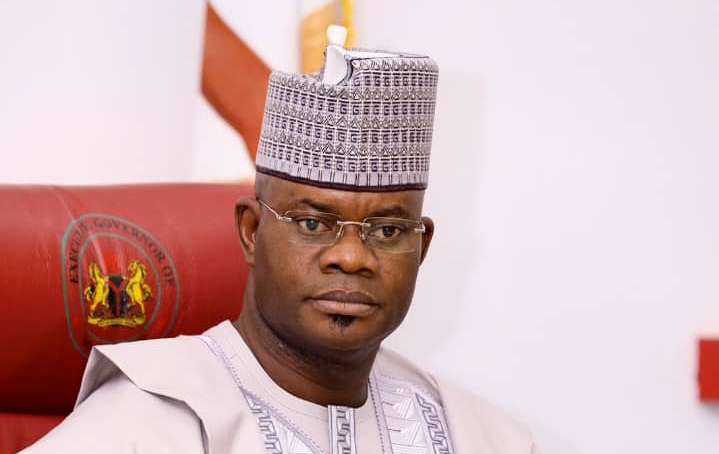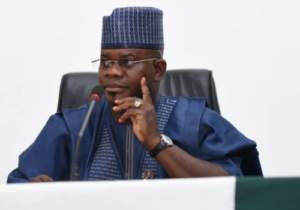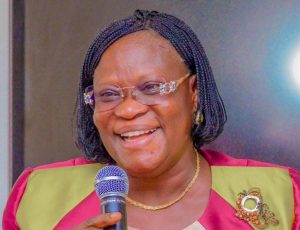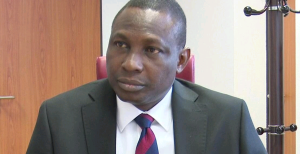Recession: Did Yahaya Bello See Today Since Yesterday?

By Abdullahi O Haruna Haruspice
“If you’re on the wrong road, progress means doing an about-turn and walking back to the right road; in that case, the man who turns back soonest is the most progressive” – C.S Lewis
All the holy books teach us that prophets come in different guises. While some come as lowly servants draped in rags, some come bearing their messages in cassocks while yet others come as philosopher kings. Whichever way, form or format they chose to appear, they come with predictions of what the future holds, good or bad.
With reports that Nigeria officially entered recession, the ordinary farmer in Osun State, the fisherman in Bayelsa State as well as the herdsman in Maiduguri, Borno State would be interested in knowing what the word itself and the reality of it means for him and his existence.
A layman’s definition of the word recession is perhaps best captured by writer Tosin Adeoti as follows: “An economy grows because the goods and services in a country increase from month to month. As the citizens of the country work, they produce goods and services. The value of those goods and services that a country produces is called the Gross Domestic Product (GDP). You sell jewelries on Instagram. Your Facebook friend manages a social media account for a company. Chivita produces fruit juice. A lecturer teaches in a University. All these and more make up the GDP. This GDP is usually measured every three months which is called a quarter of a year. These are represented by Q1 (Jan to Mar), Q2 (Apr to Jun), Q3 (Jul to Sep) and Q4 (Oct to Dec).”
In normal times, the GDP of a country increases because the more the production of goods and services, the more people are employed, the more they are employed, the more the companies expand and the more goods and services they produce. On and on!
But sometimes the GDP falls in value, not increases. Remember I said that GDP is measured in quarters. It’s fine if it falls in one quarter and then increases again. But in a scenario where the GDP falls in two quarters in a row, you have a recession.” Succinct!
So, you want to ask, what is/are the factor(s) directly responsible for Nigeria sliding into a second recession in just five years?
The COVID-19 pandemic.
Nigeria, like virtually every other country, enforced a lockdown which effectively shutdown our oil-dependent economy and also induced low prices for our crude in the international market. As a matter of fact, the Group Managing Director of the Nigerian National Petroleum Corporation (NNPC), Mallam Mele Kyari, said buyers were begged to purchase the Nigerian crude at $9 per barrel in April!
While it is correct to say the government’s hand was forced to lockdown in order to forestall loss of lives to the rampaging virus but one voice was vociferous in campaigning against the lockdown and our not-well-thought-out reaction to the pandemic.
Yahaya Bello, governor of Kogi State, almost became public enemy number 1 for insisting that Nigeria had no business shutting down the economy because of COVID-19 and when he refused to enforce a lockdown of his state, he was accused of playing politics with the lives of his citizens. How absurd?
The basic premise of Yahaya Bello’s objection to the lockdown are majorly that (1) Why lockdown an African country because of a virus that has over 99 per cent recovery rate? (2) Why lockdown a country when livelihoods are not sustainable?
Let us interrogate these two premises critically. Without playing down the seriousness of the COVID-19 pandemic, available data prove that the recovery rate in Africa is way higher than elsewhere and has made nonsense of projections for fatality on the continent. Therefore, it stands to reason that while we observe protocols to limit the spread of the virus, our response to it should not be like that of Europe and the United States of America (USA) where millions have died. Simple common sense.
Second, while Europe and the USA have social safety nets to capture and provide succour for their citizens during the lockdown and loans to start life afterwards, Nigeria is critically not able to provide such for its citizens most of whom are left to fend for themselves and survive on a bare largely informal economy, buying and selling day to day. When you shutdown such an economy simply because France and Britain also ordered a lockdown, you already know what the consequences would be.
And the consequences were not late in manifesting. Just two months after the lockdown, Nigerians began taking loans to buy food as 68 per cent of households suffered food insecurity.
The adverse effect of the lockdown which led to farmers not being able to farm and produce food leading to an outrageous spike in food prices has now advanced to cripple the whole economy.
According to the national longitudinal survey on the socio-economic effects of COVID-19 on Nigerian households, conducted by the National Bureau Of Statistics (NBS) in August, about one in four households were already indebted prior to the pandemic while nearly one-third have taken out new loans since the onset of the pandemic.
“The economic situation of Nigerians remains precarious, even months after the lockdown restrictions were loosened.”
The NBS also reported that the overall share of respondents who are working is back to pre-pandemic levels but six per cent of the respondents have not worked at all since the pandemic began while 60 per cent have experienced periods without work which indicates instability in the job market.
This points to the fact that the lockdown did more harm than good and leaves you with a tinge of regret that we did not take the warning of the Kogi State helmsman seriously.
Did Yahaya Bello see what is happening today while we were all caught in the frenzy of locking down everything in response to yesterday’s threat by the virus?
Sadly, the facts on ground support this submission. God bless Nigeria.








